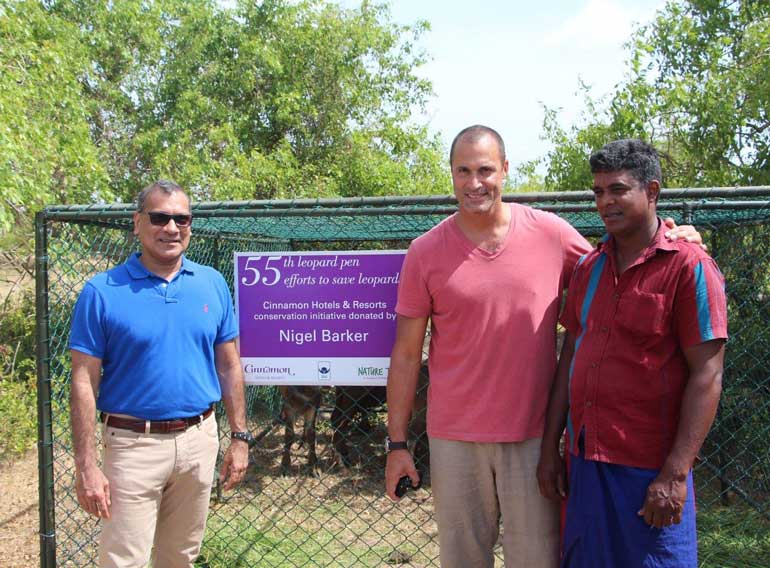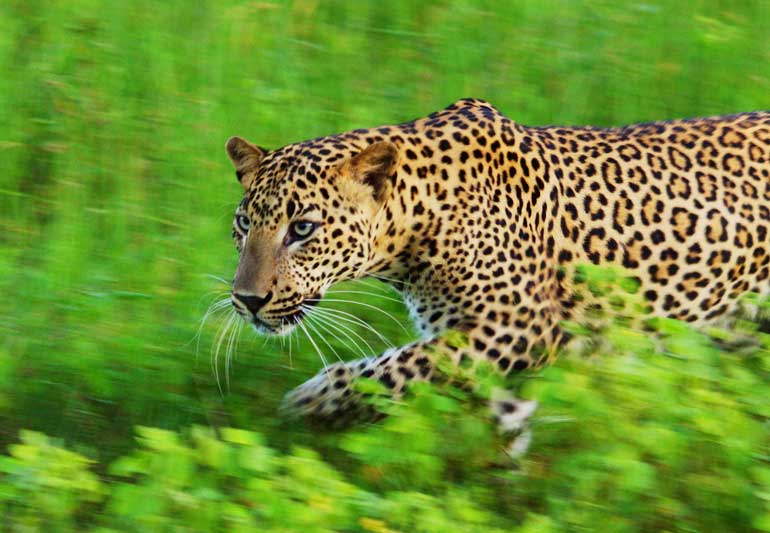Monday Feb 16, 2026
Monday Feb 16, 2026
Saturday, 8 August 2015 00:00 - - {{hitsCtrl.values.hits}}

Nigel Barker donates the 55th cattle pen to a local villager together with Cinnamon Hotels & Resorts President Ajit Gunewardene

Yala boasts one of the highest leopard densities in the world
By Himal Kotelawala
When it comes to man vs. beast theatrics in Sri Lanka, the human-elephant conflict gets the most amount of press; but one that’s just as detrimental to the peaceful coexistence of wildlife and humanity, though it doesn’t make the headlines as often, is the constant battle of wits between dairy farmers living on the periphery of the Yala sanctuary and the nearby leopards that prey on their cattle.

Solitary male leopards come in the dead of night and attack young calves that graze on the open plains outside the park perimeter, causing severe damage to the farmers’ livelihood. The farmers, in turn, are forced to use less than ethical means to drive away the offending big cats, often having to resort to violence, resulting in a no-win situation for both parties and a throbbing headache for conservationists fighting to preserve the dwindling leopard population.
Cinnamon Hotels & Resorts, a company that has built a reputation for its conservation projects in and around the area, is attempting to address this pressing issue in a deceptively simple way: By donating cattle pens to the farmers.
Titled Project Leopard, the premier hotel chain’s CSR initiative aims to support the livelihoods of local dairy farmers in the Yala Kirinda area, whilst preserving the endangered leopard species. A total of 55 out of 75 planned steel cattle pens have been donated to the farmers so far, the last of which was ceremoniously handed over to a group of farmers on 22 July by celebrity photographer, reality TV host and philanthropist Nigel Barker.
Barker, whose philanthropy and conservation efforts around the world are as well documented as his various creative ventures, was hosted in Sri Lanka by Cinnamon, and personally endorsed the project, taking into account its pragmatic approach to tackling a sensitive issue.
“Initiatives like this make a difference. However complicated or difficult or unusual they may seem, you have to push and you have to start somewhere. I congratulate Cinnamon for coming up with a great initiative and congratulate the recipients,” he said.
Yala boasts one of the highest leopard densities in the world. As Cinnamon’s Head of Eco Tourism Chitral Jayatilake told the Daily FT, a majority of the leopards attacking the cattle are young males forced out of the park by their older kin.
“Leopards are territorial animals. The young cubs born in the periphery get pushed out of the park by big males, leading them to set up territories outside the park. These leopards then come into conflict with cattle farmers, who have their cattle, both young and adult, grazing nearby. In the night, the farmers put the young ones in makeshift pens, and the leopards prey on them. It’s natural, easy prey,” he explained.
The farmers are driven to revenge, he said, when two to three young calves get killed and the mothers go dry for milk.
“It’s a defence mechanism for the farmers. To stop this conflict, we started distributing pens, and it’s been an absolute success, judging by the numbers of calves that increased over the last three years,” he added.
And the numbers keep growing. According to Jayatilake, farmers who started with just 10 calves now have more than 40.
Gamini Gunwardena, one of the farmers who received a pen from Project Leopard told Daily FT that before he set up the new pen, he would lose six to seven calves out of 10 a year. “Now there is no damage. I could actually do with one more pen,” he said.
From the perspective of the farmers, a continuous milk flow is vital for a steady income and, therefore, the protection of calves is, needless to say, of paramount importance. To the conservationists, and animal lovers in general, the preservation of Yala leopards is just as important, if not more so.
It is hoped that Project Leopard will strike a realistic balance between these two scenarios, by helping local farmers save their livelihood while ensuring that one of the country’s most iconic wild animals does not fall prey to human expansionism.